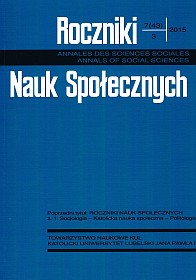Party elites vs. the other candidates in Public Radio’s free election broadcasts
Abstract
The goal of the article was to show how the authorized election committees which registered their tickets in the Lublin region before the elections for the European Parliament in 2014 used their allotted broadcast time on the Polish Radio Lublin station and what was the criterion for division of the broadcast time among individual candidates. The study sought to find whether the committees preferred party elites by allotting most of broadcast time to them, or whether the allotted time was proportionally divided among all candidates.
The research results did not conclusively show that the party elites were favored at the expense of the rest of the candidates. This is clearly seen only in the case of Coalition Election Committee Europe Plus Your Movement [Europa Plus Twój Ruch]. In the case of two election committees: Election Committee [EC] Law and Justice [Prawo i Sprawiedliwość] and EC Polish People’s Party [Polskie Stronnictwo Ludowe] the leaders appeared in each broadcast twice as often as compared with the other candidates, beginning and ending the broadcast; nevertheless the rest of the time was proportionately distributed between the other candidates.
Four election committees: EC Janusz Korwin-Mikke’s New Right [Nowa Prawica Janusza Korwin-Mikke], EC Zbigniew Ziobro’s Solidary Poland [Solidarna Polska], EC of Voters National Movement [Ruch Narodowy] and EC Direct Democracy [Demokracja Bezpośrednia] decided to use the allotted broadcast time for statements of the party leader or a representative speaking on behalf of all candidates or for a narrator; however, in each case the speaker did not introduce himself and did not promote his own candidacy, which should be treated as the promotion of the entire ticket rather than its leader only. In the other cases, the materials of those who provided their own materials on time were broadcast.
References
Jędrzejewski S., Radio renesans. Od monopolu do konkurencji, Warszawa: Wydawnictwo ATK 1997.
Kolczyński M., Strategie komunikowania politycznego, Katowice: Wydawnictwo Uniwersytetu Śląskiego 2007.
Łukasik-Turecka A., Audytywna reklama wyborcza – przeżytek czy konieczność, “Zeszyty Prasoznawcze” 2015, vol. 58, No. 1 (221), pp.167-175.
Łukasik-Turecka A., Audytywna reklama wyborcza jako narzędzie komunikowania politycznego, [in:] M. Podkowińska (ed.), Komunikacja społeczna – tendencje, problemy, wyzwania, Warszawa: Wydawnictwo SGGW 2014, pp. 31-40.
Łukasik-Turecka A., Radiowa reklama wyborcza – polecać czy odradzać (uwagi politologa), “Roczniki Nauk Społecznych” 6 (42) 2014, No. 1, pp. 95-109.
Łukasik-Turecka A., Radiowa reklama wyborcza w nieodpłatnych audycjach wyborczych radia publicznego, [in:] R. Wiszniowski, A. Kasińska-Metryka (eds.), Marketing polityczny w gorsecie mediów, Toruń: Wydawnictwo Adam Marszałek 2014, pp. 153-165.
Łukasik-Turecka A., Stosunek elektoratu do radiowych reklam wyborczych, “Preferencje Polityczne” 2014, No. 8, pp. 51-60.
Copyright (c) 2015 Roczniki Nauk Społecznych

This work is licensed under a Creative Commons Attribution-NonCommercial-NoDerivatives 4.0 International License.


